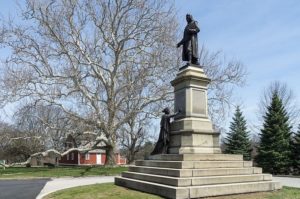 Just in time for this year’s Fourth of July week, and now having celebrated American independence by firing up our grills and throwing on the Nathan’s Famous hotdogs (a shout out to Brett Younger’s latest column) or beholding the smoke of the Big Green Egg and fireworks, many of us have been saying “holy smokes” to yet another annual rendition of “Christian nation” rhetoric. This year, the prize goes to pro-Trump pastor and de facto Protestant Pope of Fox News, Robert Jeffress of the famed First Baptist Church of Dallas.
Just in time for this year’s Fourth of July week, and now having celebrated American independence by firing up our grills and throwing on the Nathan’s Famous hotdogs (a shout out to Brett Younger’s latest column) or beholding the smoke of the Big Green Egg and fireworks, many of us have been saying “holy smokes” to yet another annual rendition of “Christian nation” rhetoric. This year, the prize goes to pro-Trump pastor and de facto Protestant Pope of Fox News, Robert Jeffress of the famed First Baptist Church of Dallas.
Pastor Jeffress, known for his political grandstanding in the name of Christ and Christianity, creates a kind of holy furor inside of my Baptist bones.
Here’s what I mean: On June 24, Jeffress led a Freedom Sunday service at his church where he delivered a sermon titled “America is a Christian Nation.” The sermon, which reiterated how the Founding Fathers were a majoritarian evangelical religious bloc, came on the heels of a billboard brouhaha that advertised the exact message of his sermon subject. It resulted in Outfront Media choosing to take down the signs in Dallas due to what the wider public deemed a divisive message.
“The message that ‘America is a Christian nation’ is flat-out false factually, legally and practically.”
The message that “America is a Christian nation” is flat-out false factually, legally and practically. The consequences of this theocratic message taken to its fullest extent pose grave dangers for religious liberty and justice for all in the land that we love.
Jeffress’ arguments count on widespread public confusion about the Constitution and the Bill of Rights. Decades-long Religious Right rhetoric has been so deeply ingrained that many well-intentioned American Christians don’t realize that such arguments rely on faulty interpretations that misrepresent history and seek to unwisely and dangerously privilege one religion over all others.
It is the latest sideshow in the endless culture war built on the fiction that the Framers in Philadelphia in 1787 intended to constitute a Christian nation. The thing is, if America was founded predominately to be a Christian nation, there is no evidence of it in the Constitution.
 Our founding document never mentions Christianity. In fact, religion is named only once in Article VI, and that was to ban religious tests for public office. The only other mention of religion would come with the adoption of the First Amendment’s religion clauses: “Congress shall make no law respecting an establishment of religion, or prohibiting the free exercise thereof.”
Our founding document never mentions Christianity. In fact, religion is named only once in Article VI, and that was to ban religious tests for public office. The only other mention of religion would come with the adoption of the First Amendment’s religion clauses: “Congress shall make no law respecting an establishment of religion, or prohibiting the free exercise thereof.”
As I have learned from America’s premier faith-based voice on church-state separation, the Baptist Joint Committee for Religious Liberty in Washington, D.C., the separation of church and state is good for both! It is the political means by which we ensure a robust religious liberty for ALL people. It simply is not true that America is a Christian nation. We are a nation of Christians (and Jews, Muslims, Hindus, Sikhs, Buddhists and people of no faith at all), but we are not a Christian nation.
Further, there is precious little evidence of being a Christian nation in U.S policies like the one we watched lived out most recently on our southern border. For the first time in this presidential administration‘s tenure, the Bible was quoted – and then to perpetuate evil. Families provide the basic element of love and nurture for any human being. That leaders in the current administration were the authors of such a policy to separate children from their parents for the sake of deterrence must be called what it really is: evil. To rip families apart and to hear the U.S. attorney general quote Romans 13 to justify it left many of us transfixed with horror. A Christian nation? No, not legally nor constitutionally, and certainly not practically.
“Privileging any one religion above another endangers our ability to work for the common good for all citizens.”
Contrary to Jeffress’ claim, we can’t put kids in cages and call ourselves a Christian nation. We can’t deny healthcare to people who can’t afford it and call ourselves a Christian nation. We can’t continue to watch our kids killed in schools by military-style weapons and call ourselves a Christian nation. And despite the faux moral outrage and public spectacle that it creates, rank-and-file evangelicals like Jeffress should not stand in pulpits and pretend that being protested for calling America a Christian nation constitutes persecution.
Despite the puritanical impulses in colonial America, our country is not a colony of the kingdom of heaven. It never has been, and it never will be, legally or constitutionally. Privileging any one religion above another endangers our ability to work for the common good for all citizens. Thus, as Virginia Baptist minister John Leland said in the 1780s, “The notion of a Christian commonwealth should be exploded forever.”

Roger Williams statue, Roger Williams Park, Providence, Rhode Island (Wikipedia Commons/Kenneth C. Zirkel)
As a freedom-loving Baptist myself who happens to be a pastor, too, Jeffress does not speak for me or the best of the historic Baptist tribe. Tried-and-true Baptists like Roger Williams, Obadiah Holmes, John Leland and even George W. Truett (incidentally, a former pastor of First Baptist Church of Dallas), must be wishing they could speak from the grave about the harmful heresy of Christian nationalism – a heresy that is harmful both to people of any religion, including Christianity, and people of no religion. It was this truth that drove the apostle of religious liberty, Roger Williams, to found Providence, Rhode Island, after he was kicked out of Massachusetts by theocrats. Williams advocated as far back as the 1630s a “hedge or wall of separation between the garden of the church and the wilderness of the world.” He knew long before our Founding Fathers that religious freedom must be for everybody or it is good for nobody.
Echoes of Williams’ “wall” metaphor are found more famously in Thomas Jefferson’s coinage of that phrase still wisely and widely used today to describe the proper relationship between church and state, “the wall of separation.”
Jefferson wrote in an 1802 letter to the Danbury (Connecticut) Baptist Association: “I contemplate with sovereign reverence the act of the American people which declared that Congress should make no law respecting an establishment of religion or prohibiting the free exercise thereof, thus building a wall of separation between church and state.”
On this or any other Fourth of July week, let it be Jefferson, not Jeffress, who leads us to the right side of both Baptist history and American history. The Jeffersonian genius and wisdom of the American experiment in religious freedom is that we are not a Christian nation or a Jewish nation or a Muslim nation or any nation that is founded on a single religion.
Any attempt to claim or create a Christian theocracy is a grave danger to our democracy. For, as my religio-political mentor and friend and Baptist firebrand himself, James Dunn, would wisely remind us: “The trouble with a theocracy is everyone wants to be Theo!“
That ought to be enough to make all of us say again, “Holy smokes.”
